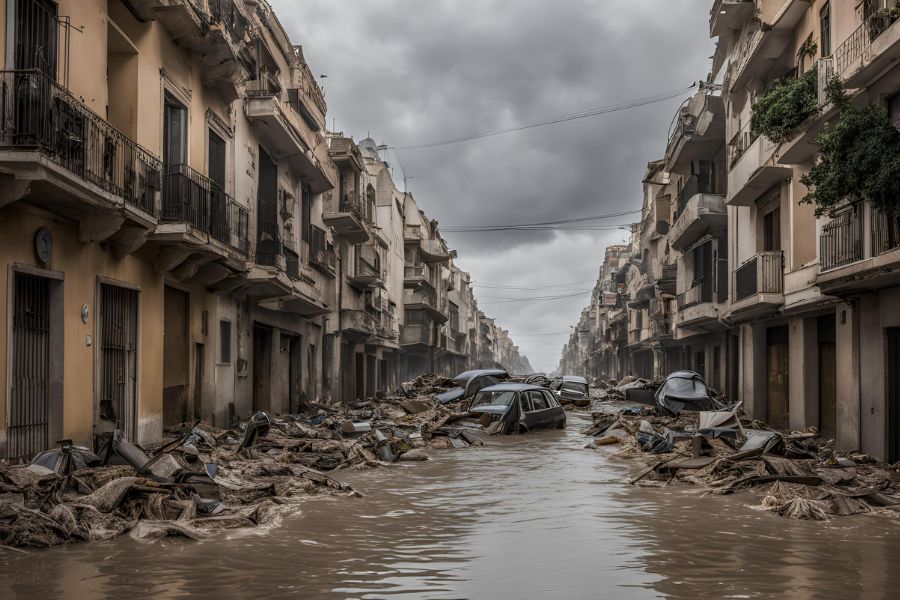What began as a typical storm quickly escalated into a devastating disaster in the small towns of Valencia, Spain.
On Oct. 29, 2024, Valencia was hit by heavy rain that brought a year’s worth of water in just eight hours. This caused floods that quickly filled streets, damaged homes, and swept away cars. Many people were left without homes, and the strong storm made it hard for rescuers to help those in need.
“I have heard of the flooding in Spain. The floods caused people to lose their homes, and lives were lost,” said Dulce Carvajal, a senior student. “I feel very upset for them because it must be heartbreaking for the families that lost their loved ones.”
Spanish newspaper El País details how rivers and reservoirs like the Rambla del Poyo overflowed, causing bridges to collapse and leaving areas like Picaña inundated. It also described the widespread power outages that affected 140,000 people.
The floods became worse as the water levels kept rising. Bridges, roads, and other important structures were destroyed, making it harder for help to reach people. Many areas lost power, and phone service was down. El País reports rescuers had to use boats to get to people trapped in their homes.
“I know that natural disasters cause people to lose electricity in their homes and lose all their belongings,” Carvajal said. “I feel bad that people have to go through that because some insurance policies don’t cover the damages.”
The streets in Valencia looked like rivers. In some places, the water was so high that cars couldn’t move, and people had to climb to rooftops for safety. Hospitals were crowded with injured people, and buses and trains stopped running.
News about the floods spread quickly. TV and newspapers showed the damage and the bravery of rescuers. On social media, people used hashtags like #ValenciaFloods to share updates and organize help. The government promised to help and asked for support from international groups.
“I think they should send help from other countries and places in Spain that have not been destroyed,” said Madison Flores, a senior student. “And give people shelters. Also, provide them with food and necessities.”
Many people shared their experiences after the flood. Some talked about escaping through windows or being saved by neighbors. Sadly, others lost family members to the rushing water, and some still haven’t found their loved ones.
“I believe the government did not respond well,” said Jazzlyn Carvajal, a sophomore student. “They didn’t make sure the people evacuated the municipalities. The government should make a funding program for the victims.”
After the floods, a huge wave of support came together. EFE newspaper reports that around “45,000 to 50,000 volunteers” went to affected areas to help, handing out food and assisting with cleanup efforts. Organizations like the Adventist Development and Relief Agency played an important role by providing “food, water, medicine, and other basic supplies” to families who lost everything.
The Huffington Post says that Morocco also stepped in to help, with “King Mohamed VI sending 80 workers and 25 tanker trucks” to assist with cleaning and recovery efforts in Valencia.
The Spanish government has put major plans in place to fix the damage caused by the floods. The Ministry of Transport set aside €34 million to repair local infrastructures damaged by the DANA storm in Valencia. The first phase focuses on fixing 11 bridges and walkways in towns like Paiporta, Pincaya, Manises, and Riba-roja de Túria. In total, the ministry will spend €54 million to restore 37 infrastructures across 12 municipalities, Cadena SER reports.
The floods have shown the urgent need for better strategies to deal with natural disasters and stronger infrastructure in Valencia. Experts say this disaster is part of a bigger global trend of more frequent flooding, made worse by climate change.
“I think it’s very sad and disturbing to see that the government didn’t help on time to prevent further damages,” said Flores.
According to Reuters, 2024 was the hottest year in 125,000 years, and global CO2 emissions reached record highs, which has led to more extreme weather events. ESN EU reports that experts agree on the need to invest in climate adaptation, better risk notification systems, and stronger emergency services. These changes would help ensure that immediate response efforts smoothly transition into long-term recovery plans.
The recent floods in Valencia remind us of how cities are becoming more vulnerable to extreme weather. Valencia, along with other cities, needs to invest in better infrastructure, better flood management, and early warning systems. We can’t just wait for the next disaster to respond; we need to act now.









